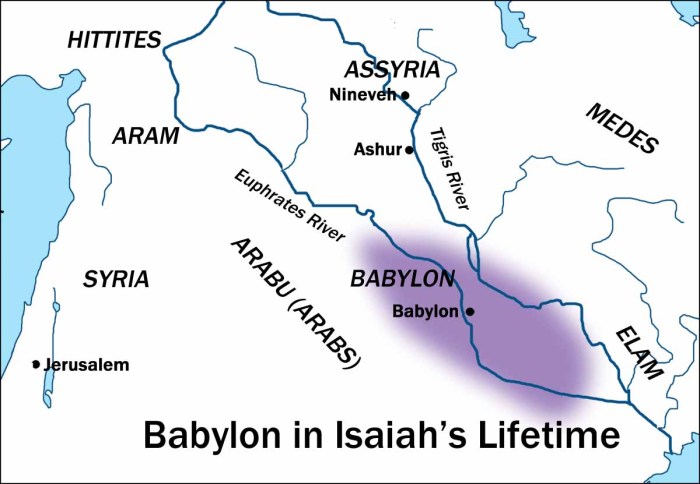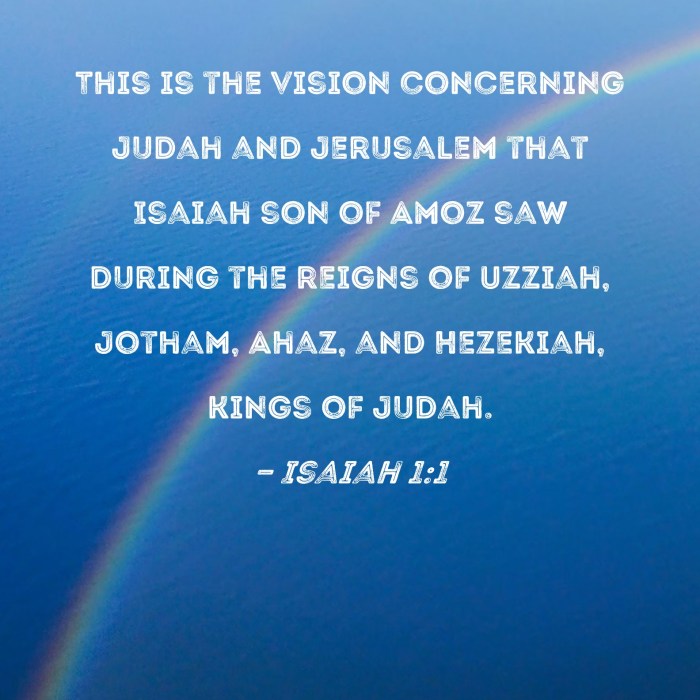What was the spiritual climate in Judah during Isaiah’s ministry? This inquiry delves into the religious beliefs, practices, and social conditions that shaped the spiritual landscape of Judah during the time of the prophet Isaiah. By examining Isaiah’s prophetic ministry, we gain insights into the challenges and opportunities that the people of Judah faced, and the transformative power of repentance and renewal.
During Isaiah’s time, Judah was a nation grappling with political turmoil, social injustice, and religious decline. The people had turned away from God and embraced idolatry and pagan practices. Isaiah’s prophecies served as a wake-up call, urging the people to repent and return to the Lord.
Religious Beliefs and Practices

During Isaiah’s ministry, Judah’s religious beliefs and practices were heavily influenced by the official state religion, which centered around the worship of Yahweh at the Temple in Jerusalem.
The people observed various rituals and ceremonies, including sacrifices, offerings, and festivals, to express their devotion and seek God’s favor. They also practiced divination and consulted with prophets for guidance and insight.
Influence of Neighboring Nations
Judah’s religious landscape was not isolated but influenced by the beliefs and practices of neighboring nations, particularly those of the Assyrians and Babylonians. This exposure led to the adoption of certain foreign elements into Judah’s religious practices.
Prophetic Ministry of Isaiah
Role and Mission
Isaiah was a prominent prophet during the reigns of Kings Uzziah, Jotham, Ahaz, and Hezekiah. His primary role was to deliver God’s messages to the people of Judah, calling them to repentance and warning them of impending judgment.
Key Themes and Messages
- The holiness and sovereignty of God
- The sinfulness and rebellion of Judah
- The coming judgment and destruction of the nation
- The promise of restoration and hope
Impact on Spiritual Climate
Isaiah’s prophecies had a profound impact on the spiritual climate of Judah. His messages of judgment brought conviction and fear, while his words of hope offered comfort and assurance. His ministry helped to shape the religious beliefs and practices of the people, leading to a renewed focus on righteousness and a desire for spiritual renewal.
Social and Political Conditions
Judah during Isaiah’s time faced numerous social and political challenges. The nation was plagued by poverty, inequality, and oppression. The ruling class was corrupt and unjust, while the people suffered under heavy taxation and military conscription.
Major Conflicts
- Wars with neighboring nations, such as Assyria and Babylon
- Internal strife and divisions within the kingdom
- Political instability and power struggles
Impact on Spiritual Climate
The social and political conditions of Judah contributed to a decline in spiritual vitality. The people became disillusioned and lost faith in their leaders and institutions. This crisis of faith created a fertile ground for idolatry and syncretism.
Divine Judgment and Restoration

Concept of Divine Judgment
Isaiah conveyed the message that God’s judgment was imminent upon Judah for its sins and rebellion. He predicted the destruction of Jerusalem and the exile of the people to Babylon.
Manifestation of Judgment, What was the spiritual climate in judah during isaiah’s ministry
- Military invasions and defeat by foreign powers
- Natural disasters and famines
- Moral and spiritual decay
Message of Hope and Restoration
Despite the prophecies of judgment, Isaiah also offered a message of hope and restoration. He predicted that after the period of exile, God would restore Judah and establish a new covenant with his people.
Call to Repentance and Renewal: What Was The Spiritual Climate In Judah During Isaiah’s Ministry

Importance of Repentance
Isaiah emphasized the importance of personal and communal repentance as the key to restoring the nation’s relationship with God. He called on the people to turn away from their sins, seek forgiveness, and live in accordance with God’s commandments.
Transformative Power of Repentance
Repentance was seen as a transformative act that could bring about a profound change in the spiritual climate of the nation. It would lead to a renewed sense of faith, a deeper understanding of God’s character, and a commitment to righteousness.
Essential FAQs
What were the dominant religious beliefs and practices in Judah during Isaiah’s ministry?
The people of Judah adhered to the monotheistic worship of Yahweh, but their practices were often tainted by syncretism and idolatry. They engaged in rituals and ceremonies at the Temple in Jerusalem, but their hearts were often far from God.
What were the key themes of Isaiah’s prophecies?
Isaiah’s prophecies focused on themes of judgment and restoration. He denounced the sins of the people and warned of God’s impending judgment. However, he also offered a message of hope, calling the people to repent and return to the Lord.
How did Isaiah’s ministry impact the spiritual climate of Judah?
Isaiah’s ministry challenged the complacency and idolatry of the people. His prophecies brought about a spiritual awakening, leading many to repent and seek God’s forgiveness.